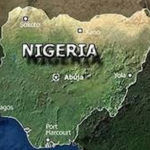In the transition of life
In the circling of the earth
The moon and sun evolve
So do humans
In our days, in our evenings
Two powerful forcesstare us in the face:
Life and death
Between these two forces our life is lived
Bí ènì ṣe rí, ọ̀la ò rí bẹ́ è,
Ló n mú babaláwo d’ífa ojojúmọ́
Each day, we live hoping that the treeswe planted for our unborn children bring them peace
By our sojournthrough the abode of our greatest ancestors we breath
Hoping our children find life
Akinyele labored this path till he took his flight
At the time the wisdom of the elders and the energies of the young ones are in dire need,
We lost a veteran soldier
The sixteen doors that lead to your beloved city of Ibadan mourn
The savannah and the forest grieve
Its human population and living features bemoan your departure
Yet, we all rejoice in the life you lived and
The heritage of your survival above the clouds of Oke.
Since its existence as a sovereign state, there has never been a question about the peculiar concentration of human and natural resources in Nigeria. The sophistication of its people and the vastness of its green lands have been the selling point of the country, giving it the accolade of a giant. Tellingly, our ancestors’ ancient wisdom reveals that a single tree does not stand the chance of making a forest. In lieu, a forest worth its name is a conglomeration of countless trees networking their branches and rooting their stems to gain territory and to protect the ecosystem. Accordingly, Nigeria’s stature in the comity of nations and the hope it portends among equals is not unrelated to the stellar concentration of Irokos in the polity. In its charismatic feature, the Iroko represents a formidable figure among other economic trees in the forest. When its attributes are transferred to a human figure, it means many things, among which we can talk about profound intellectuality, wisdom, strength, persistence, passion, perseverance, patriotism, and many more. Chief Theophilus Adeleke Akinyele, Philip Asiodu, Joe Garba, Simon Adebo, and others that transcend a particular period in Nigeria’s history have graced the country’s public service space at various times to earn the well-deserving accolade of an Iroko. To these honorable statemen, bureaucratic efficiency and consistent civil service reforms are integral to a sustainable nation-state.
On the eve of its independence, all was set for the indigenisation of the Nigerian state and the modern governance structure. With democracy comes the responsibility of conducting elections to select the people’s representatives at all levels. So, together with other necessities of contemporary governance, the first Nigerian electoral body was established in 1959 with the hope of anchoring the elections that would determine the people’s representatives upon independence.
Chief Theophilus Adeleke Akinyele, the Bobajiro of Ibadanland, was saddled with the responsibility of playing a significant role in this quest. Born on February 29, 1932, and upon laying the foundation of his beloved city of warriors, Ibadan, Chief Akinyele was only 26 when this lot fell on him. His frontline participation in the elections undoubtedly had a significant implication on subsequent life-long engagements in the Nigerian government that frequently help society evolve. Upon independence, he rose to become a Permanent Secretary in the Ministry of Agriculture and later in the Ministry of Finance in the then Western Region. His outstanding performance helped to substantially manage the revenues generated from agricultural produce and the region’s economy. The record and achievements of government institutions, particularly in these two key areas that formed the basis of the region’s political economy at the time, were conspicuous enough even for a layman. It is worth emphasizing at this point, however, that the shift in the political-economic formation of the region, and the entire country, from an agro-based economy and institutions which the likes of Chief Akinyele built, is responsible for the present state of society with its myriads of leviathans threatening to consume it.
Government investment in education, health, infrastructural and industrial efforts, and all other essential quarters of governance in the Western Region passed through his table at every crucial stage. He was expected to make good his expertise on these vital government policies.It is remarkable to note that the managerial and intellectual sagacity of Chief Akinyele came to endear him to more incredible opportunities at serving his fatherland. In 1979, following the first democratization process after the 1966 military putsch anchored by the Muritala/Obasanjo regime, he was appointed as Federal Director of Budget and Special Adviser to the government on Budget Affairs by the Shagari administration. Unfortunately, he poignantly described the situation at this time: “the absence of democratic governance in most of post-independence Nigeria, and the pervasiveness of authoritarian and corrupt civil regimes, as well as military dictatorships, have contributed significantly to the mismanagement of the country’s development prospects.” He used this to express his disappointment with pervasive elements among his counterparts in public service who gave military juntas an excuse to seize power, rape the democratic structure, and bastardize the system.
Many of his views about the state and the economy were either ignored or deflated for political reasons. As an intellectual administrator, Chief Akinyele published an article titled “P.P.B.S. in Former Western Nigeria: History, Progress and Problems in Nigeria,” where he outlined his experience in Planning-Programming-Budget Systems as a former front-man in the decision-making process of the region. Around this same time, the meticulous bearing he had on government institutions and his sense of responsibility was needed at the newly established University of Ife (now Obafemi Awolowo University). There, he was appointed Registrar and Secretary to the Council of the university. Rising to the civil service’s highest echelon, Chief Akinyele became the Head of Service and Secretary in the Old Oyo State. Aside from his grooming in the school of life, Baba Akinyele was trained at different times by the very best institutions in the world at the time. From the University of Ibadan (then known as University College), Chief Akinyele went to Oxford University, University of Connecticut, and Harvard Business School to sharpen his intellect. Convinced that “the Ibadan’s fate in the area of industrialization is a veritable case study in the inglorious triumph of senseless politics over common sense economics” and that his fatherland needed a “government that is long in memory and far in sight” for the planning and execution of government developmental policies, he contested for the governorship election in Oyo State in 1982. Even though he never made it past the primaries due to the threats of “moneybags” and those with the ability to roll the political dice, his ideas resonated well among Oyo state’s ordinary people.
In any case, this election was one last stroke brought to the fore once again as the democratic jinx in Nigerian political history. In Baba, the “akin” saw him consistently working at the state’s highest level to effect change either in partnership with the government or in the opposition as his expertise was always needed in navigating the technicality of governance and institutional management. Therefore, following his 1980 publication on the Planning-Programming-Budget system, in 1988, he published his views concerning the Structural Adjustment Program (SAP) in a book he titled Budgeting under Structural Adjustment Programme. At another critical time in Nigeria’s democratization process, Chief Akinyele wrote a lucid article on the intricacies of politicking and electioneering in Nigeria,exclusively providing insight from an intellectual staged at the frontline of the unfolding political process in the first decade of the fourth republic.The two cardinals upon whichhe admonished Nigerian electorates in his review of the 2003 elections—pragmatism and sophistication in choices—constituted the basic manual with which baba Akinyele lived a glorious life. Of course, this becomes imperative when we consider that, as he asserted elsewhere, “The present is still unfolding for the subtle mind to ponder upon while the future is in the limbo of time.” Driven by this consciousness, the Nigerian state’s political climate could be saved from imminent collapse into the abyss of ethnicity and religious cleavages in politics.
More than at any other time in the history of our staggering country, Nigeria, we, the ones Baba Akinyele left behind on October 26, 2020, owe it to his legacy to ensure that in our choices in theevolution of the political ecology of society are sophisticated and pragmatic, based on economic and other rational considerations that disregard ethnicity, region or religion. During his address at the 2010 OluyoleClub of Lagos Annual Conference, where he discussed the economic relevance of Ibadan from its formative years to the present, the intellectual administrator went into the history of how the splendor of the city was torpedoed by political machinations and shenanigans of the post-colonial government from the region to the creation of states. A historian couldnot have done better in his careful exploration of the collective memories that mold the state’s political-economic reality. His deeply insightful publications, which primarily border on budgeting, finance, democracy, and governance in Nigeria, have been edited and published by Babatunde Oyedeji in 2002. Readings in Political Economy and Governance in Nigeria: Selected Speeches and Articles of Chief T.A. Akinyele consists of his significant contributions to the ongoing discourse about the nation’s state as a leading actor. Indeed, his pedigree won him the national honor of the Officer of the Order of the Niger (O.O.N.) conferred by the Obasanjo administration in 2000. Although he left us, the infinite wisdom he bequeathed on us remains.
So, we ask the shadow of death to save us its threat
The empty fields will be full of grass
The libation and love you’ve watered the fields shall make them green
Yes! We see it
We feel it, even in the drench ofour broken heart in the melancholic hills
Although you were born in a city made of sixteen doors, the doors of wisdom you have opened are thirty-six and more
Infinite in their textuality
Abundantly gratifying in their orality
Come rain come shine
They come evergreen.
I learnt life comes in time and season
It also comes with style and color
Akinyele painted the clouds blue
But left us to the darkest horrors of our time
How do we tender this forest of trees?
Who will tell us where the tree of our ignorance and intolerance will fall in this forest full of pythons and hyenas?
Who will warn us when the long hands of the devil are aiming at us on the dining table?
Mesìọ̀gọ̀, n’ílé Olúyọ̀lé
The shoes you left behind are beyond us
Beyond us is your cap of honor
and gbariyẹ of integrity
but your legacy is well written and beyond invisibility
You shall never be forgotten
Falola is University Distinguished Teaching Professor and Humanities Chair, The University of Texas at Austin.
YOU SHOULD NOT MISS THESE HEADLINES FROM NIGERIAN TRIBUNE
The All Progressives Congress (APC) has told a Federal High Court in Abuja, that the Comrade Adams Oshiomhole-led National Working Committee (NWC) was sacked to solve the internal leadership crises rocking the party.
The party also said that immediately the Caretaker/Extraordinary Convention Planning Committee was put in place after the NWC’s dissolution, the crises that had characterised its affairs were laid to rest.Chief T. A. Akinyele Chief T. A. Akinyele
The Emir of Zazzau, in Kaduna State, Alhaji Shehu Idris has died in his palace at the age of 84.Chief T. A. Akinyele
His son, Aminu Shehu Idris, confirmed in an interview with the Tribune Online that his late father who was appointed on 15th February, 1975 and spent 45 years in the throne died on Sunday after a protracted illness.Chief T. A. Akinyele Chief T. A. Akinyele
Post COVID-19: Kano based industrialist tasks FG on economy
A Kano based industrialist, Chief Kalu Ogbonnaya, has advised the Federal Government to take necessary steps to stimulate the nation’s economy to prevent a recession post COVID-19.Chief T. A. Akinyele






